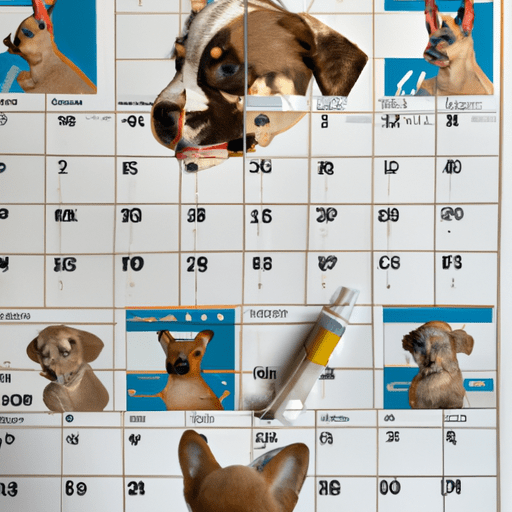“`markdown
What Yearly Shots Do Dogs Need?
As a caregiver to your furry friend, it’s essential to understand the importance of regular vaccinations to ensure their health and wellbeing. Here’s a comprehensive guide on the yearly shots your dogs need.
1. Core Vaccines
Core vaccines are crucial for all dogs, regardless of their age, breed, or health status. These vaccines protect them against common, potentially fatal diseases.
- Canine Parvovirus: This highly contagious virus affects dogs of all ages but is especially severe in puppies.
- Canine Distemper: This virus can lead to severe complications like respiratory and neurological problems.
- Canine Hepatitis: An infectious disease that affects the liver, kidneys, lungs, and eyes of dogs.
2. Non-Core Vaccines
Non-Core vaccines are administered based on your dog’s lifestyle, environment, and risk factors.
- Canine Kennel Cough: Recommended for dogs frequently exposed to boarding facilities or dog parks.
- Canine Leptospirosis: This vaccination is administered to dogs that are often in contact with wildlife or exposed to contaminated water.
3. Puppy Vaccination Schedule
You might wonder when exactly your puppies should get their shots. The following table outlines a typical vaccination schedule for puppies:
| Age | Vaccine |
|---|---|
| 6-8 weeks | Parvovirus, Distemper |
| 10-12 weeks | Hepatitis, Kennel Cough |
| 16-18 weeks | Rabies |
4. Adult Dog Vaccination Schedule
For adult dogs, the vaccination schedule becomes less frequent but it’s still crucial to ensure their long-term health.
- Annual boosters for Parvovirus, Distemper, and Hepatitis.
- Rabies shots every 1-3 years, depending on local regulations.
- Kennel Cough and Leptospirosis boosters based on lifestyle and risk assessment.
5. The Importance of Regular Vet Check-ups
Remember, your beloved pet’s health is a lifelong commitment. Regular vet check-ups not only ensure your dog stays up-to-date with their shots but also catch any potential health issues early on.
FAQs
Q1: Are there any side effects to these vaccinations?
A1: Side effects are typically mild and short-term. However, if your dog shows severe reactions such as loss of appetite, vomiting, or lethargy, consult your vet immediately.
Q2: Can I miss a year of vaccinations?
A2: Consistency is key in vaccination schedules. Missing a shot can leave your dog vulnerable to serious diseases.
Q3: Are there natural alternatives to vaccinations?
A3: While there are natural remedies for many ailments, there are currently no proven natural alternatives to vaccinations.
Q4: Do indoor dogs need vaccinations?
A4: Yes, even indoor dogs need vaccinations as some diseases are airborne or can be brought into the home.
Q5: What to do if I’ve adopted an adult dog with no vaccination history?
A5: Your vet will likely recommend starting a vaccination schedule as if your dog were a puppy to ensure they’re fully protected.
“`



